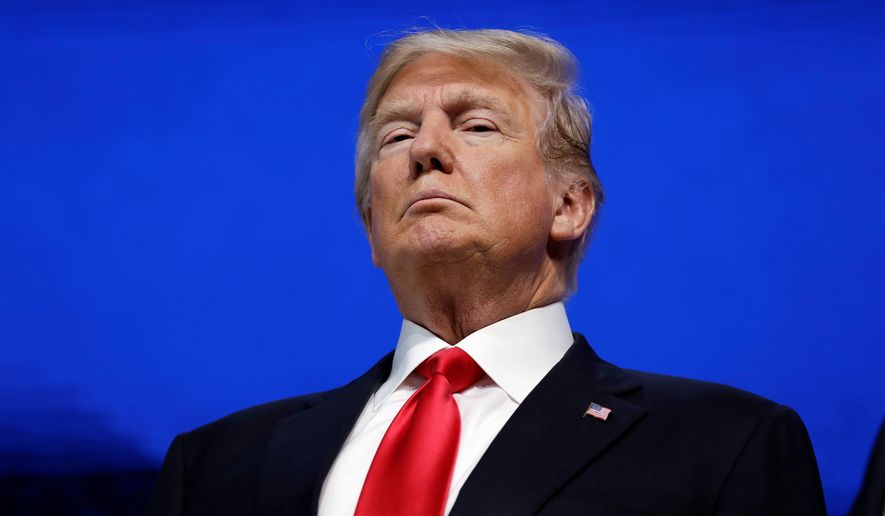Immigrants will be a big part of Trump’s State of the Union address — and live audience
Dozens of Dreamers will look on from the viewing galleries Tuesday as President Trump uses his State of the Union address to push for a deal that will finally grant them a full pathway to citizenship, coupled with serious border security efforts and major policy changes.
More than any other president in modern political history, Mr. Trump has been proactive on the issue, leaning into Congress from his first days in office to press for solutions on immigration.
During last year’s address to a joint session of Congress, Mr. Trump devoted more time than any previous president to immigration, and he said Monday it will again be a big part of his “important” speech.
“For many, many years they’ve been talking immigration, they never got anything done. We’re going to get something done, we hope,” the president said.
He has called for a grand bargain, proposing a generous amnesty that would grant citizenship rights to 1.8 million Dreamers in exchange for construction of his border wall, further limits to the chain of family migration, and an end to the Diversity Visa Lottery.
That poses a dilemma for Dreamers, who for years have begged for the kind of legalization that the president is proposing — but who say the price he is asking, in terms of other changes to immigration, is steep.Some Dreamers and allied immigrant rights activists plan to rally outside the Capitol ahead of Mr. Trump’s speech, staging what they are calling a funeral procession, accusing the president of killing the “clean” legalization bill they wanted.
“This administration is tearing families apart and driving people into the shadows in the name of making America White again,” said Sookyung Oh, Washington area director for the National Korean American Service & Education Consortium.
Inside the Capitol, meanwhile, dozens of Dreamers will be in the House chamber for Mr. Trump’s speech as guests of Democratic members of Congress. It is believed the biggest group of illegal immigrants ever to watch the speech in person.
“As a young girl born in Belize, a country of no more than 370,000 people, I could’ve never fathomed that I’d be invited as a guest to the State of the Union address,” said Denea Joseph, who is one of nearly 700,000 Dreamers protected by the Obama-era Deferred Action for Childhood Arrivals deportation amnesty.
She will be a guest of Sen. Kamala D. Harris, California Democrat, and said in a statement released by the senator’s office that she doesn’t want a bill that toughens enforcement for other illegal immigrants while offering legal status to Dreamers.
“The time is now to pass a clean Dream Act that doesn’t use undocumented youth to criminalize the original ‘Dreamers’ — our parents and grandparents,” she said.
Also in attendance will be people whose illegal immigrant family members have been deported and several people in the U.S. under special humanitarian protections that the Trump administration is bringing to an end.
“I love this country. I feel I am part of this country. I’ve lived in this country for more years than El Salvador,” said Edenilson Granados, a Salvadoran who has been in the U.S. under temporary protected status for nearly two decades since a 1998 earthquake.
The Trump administration decided the country has recovered enough from the earthquake to take back its people.
Dreamers have attended State of the Union addresses dating back to at least 2013, just after the Obama administration created the DACA program that granted them a stay of deportation. With that protection, a handful showed up to watch the speech.
As first lady, Michelle Obama hosted Dreamers and former illegal immigrants in her box during several of her husband’s speeches.
The Trump administration, meanwhile, has chosen to highlight the other side of the immigration debate. First lady Melania Trump will host two families whose teen daughters were slain by the violent and mostly immigrant MS-13 gang.
Mrs. Trump will also be joined by CJ Martinez, an agent at U.S. Immigration and Customs Enforcement, who according to the White House has been involved in investigations that have led to more than 100 MS-13 gang arrests, on charges ranging from homicide to drug and weapons trafficking.
Mr. Trump has pushed the issue further than it has been in decades and could oversee passage of the first major immigration legislation in two decades. The last big bill cleared in 1996, when congressional Republicans and President Clinton got together on a major crackdown on illegal immigration.
Mr. Clinton had called for just such action in his 1995 speech, complained that Americans were “rightly disturbed by the large numbers of illegal aliens entering our country.” He said they were a threat to Americans’ jobs and safety and that Congress needed to “speed deportations.”
“It is wrong and ultimately self-defeating for a nation of immigrants to permit the kind of abuse of our immigration laws we have seen in recent years, and we must do more to stop it,” Mr. Clinton said.
His successors, Presidents George W. Bush and Barack Obama, took softer lines, using State of the Union addresses to push for legalization of most illegal immigrants.
Mr. Trump is offering a compromise, calling for a targeted legalization coupled with stiffer enforcement.
“It’s got to be bipartisan because the Republicans really don’t have the votes to get it done in any other way, so it has to be bipartisan,” Mr. Trump said Monday. “But hopefully the Democrats will join us, or enough of them will join us, so we can really do something great, for DACA and for immigration generally.”
His plea has been met with stiff resistance on both sides.
Democrats have said his effort to toughen enforcement was part of a white supremacist plot, while Republicans have said granting full citizenship to illegal immigrants undermined the law and would entice a new wave of illegal immigrants anticipating the next amnesty.


Comments
Post a Comment